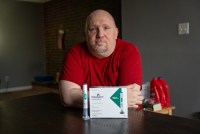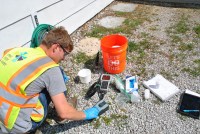Latest KFF Health News Stories
Swap Funds or Add Services? Use of Opioid Settlement Cash Sparks Strong Disagreements
The national opioid settlements don’t prohibit using money for initiatives already supported by other means, but doing so could dilute the impact.
As Bans Spread, Fluoride in Drinking Water Divides Communities Across the US
The broad availability of over-the-counter dental products containing fluoride has some community leaders arguing that its addition to public drinking water is no longer necessary. But public health experts worry that, much like vaccines, fluoridation may be a victim of its own success.
As money flows to abortion rights initiatives in states, some donors focus on where anger over the “Dobbs” ruling could propel voter turnout and spur Democratic victories up and down the ballot, including in key Senate races and the White House.
As More States Target Disavowed ‘Excited Delirium’ Diagnosis, Police Groups Push Back
After California passed the first law in the nation to limit the disavowed term “excited delirium,” bills in other states are being introduced to help end use of the diagnosis. But momentum is being met with resistance from law enforcement and first responder groups, who cite free speech.
VIP Health System for Top US Officials Risked Jeopardizing Care for Soldiers
The historically troubled White House Medical Unit is just one part of a government health system that gives VIP care to top officials, military officers, military retirees, and families. Pentagon investigators say some were prioritized over rank-and-file soldiers.
The Powerful Constraints on Medical Care in Catholic Hospitals Across America
The expansion of Catholic hospitals nationwide leaves patients at the mercy of the church’s religious directives, which are often at odds with accepted medical standards.
States Target Health Insurers’ ‘Prior Authorization’ Red Tape
Doctors, patients, and hospitals have railed for years about the prior authorization processes that health insurers use to decide whether they’ll pay for patients’ drugs or medical procedures. The Biden administration announced a crackdown in January, but some state lawmakers are looking to go further.
Where Are the Nation’s Primary Care Providers? It’s Not an Easy Answer
Politicians keep talking about fixing primary care shortages. But flawed national data leaves big holes in how to evaluate which policies are effective.
Inside the Pentagon’s Painfully Slow Effort to Clean Up Decades of PFAS Contamination
Cost estimates balloon and complications mount as the Defense Department grapples with PFAS pollution at hundreds of its bases and surrounding communities.
‘Forever Chemicals’ Found in Freshwater Fish, Yet Most States Don’t Warn Residents
At least 17 states have issued PFAS-related fish consumption advisories, KFF Health News found. But with no federal guidance, what is considered safe to eat varies significantly among states, most of which provide no regulation.
US Military Says National Security Depends on ‘Forever Chemicals’
PFAS chemicals are found in hundreds of products and weapons used by the U.S. military. Defense Department officials say a blanket ban on these man-made substances would threaten military readiness.
‘Worse Than People Can Imagine’: Medicaid ‘Unwinding’ Breeds Chaos in States
As Medicaid programs across the nation review enrollees’ status in the wake of the pandemic, patients struggle to navigate the upheaval.
Smaller Employers Weigh a Big-Company Fix for Scarce Primary Care: Their Own Clinics
Company health clinics are most common at large workplaces, but some small employers say they see advantages, too: healthier workers, lower costs, and better access to primary care.
Millions of Rural Americans Rely on Private Wells. Few Regularly Test Their Water.
More than 43 million Americans drink, bathe, and cook with water from private wells, which can be tainted by farm or industrial runoff, leaky septic systems, or naturally occurring minerals.
Feds Hope to Cut Sepsis Deaths by Hitching Medicare Payments to Treatment Stats
A new rule sets specific treatment metrics for suspected sepsis cases in an effort to reduce deaths, but some experts say the measures could add to antibiotic overuse and need to be more flexible.
These Appalachia Hospitals Made Big Promises to Gain a Monopoly. They’re Failing to Deliver.
Ballad Health, the only hospital system across a large swath of Tennessee and Virginia, has fallen short of quality-of-care and charity care obligations — even as it’s sued thousands of patients for unpaid bills.
How Will Rural Americans Fare During Medicaid Unwinding? Experts Fear They’re on Their Own
As states review their Medicaid rolls after the expiration of a pandemic-era prohibition against kicking recipients off the government insurance program, experts say the lack of help available to rural Americans in navigating insurance options puts them at greater risk of losing health coverage than people in metropolitan areas.
‘Like a Russian Roulette’: US Military Firefighters Grapple With Unknowns of PFAS Exposure
Federal research linking “forever chemicals” to testicular cancer confirms what U.S. military personnel long suspected. But as they seek testing for PFAS exposure, many wonder what to do with the results. There’s no medical treatment yet.
Even in the Most Depressed County in America, Stigma Around Mental Illness Persists
An estimated 32% of adults in Logan County, West Virginia, have been diagnosed with depression, the highest rate in the United States, according to a recent CDC report.
Timing and Cost of New Vaccines Vary by Virus and Health Insurance Status
Flu. Covid. RSV. When and how to get vaccinated against them can be confusing. Here are some of the most important things to know.


























